PS1: Attitudes in One Division
The Psychological Advisory Committee to the Special Study Group, G-2, recommended that the questionnaire technique be employed to ascertain the underlying factors affecting morale in the Army.
a. For this first study the attitudes surveyed can be broadly classified under the following areas:
- Adjustment to the Army
- Attitude toward Leadership
- Attitude toward Training
- Attitude toward Special Service Activities
Questionnaire
Date
Original Size
Location
Sample Description
a. A representative cross section of 1052 enlisted men from the Ninth Infantry Division composed of both Regular Army men and selectees.
b. A second sample of 431 additional Selectees to aid in more intensive analysis of Selectees.
c. A third sample of all remaining College men was taken, giving an additional 395 cases of College men.
Sample Method
Planning Survey I was designed to secure, by means of a combination of the public opinion technique and statistical methods, material of value to War Department planning agencies as well as to the Special Services Branch. The questionnaire and survey method were pretested on November 13th and 19th, 1941, in a Quartermaster Corps at Camp Lee, Va., a Replacement Training Center. The sample consisted of 192 selectees from 12 companies. It was determined from this pretest that the schedule could be filled out by men in classes I, II and III (Army General Classification Test) and by those men in Class IV who had completed grade school, in supervised groups of 20 to 40 men, without sacrifice of validity in the results. It was further demonstrated that comparable results could be obtained from the men of Class V and the remaining men of Class IV, as well as from the few illiterates and members of foreign language groups, by personal interviews with the same questionnaire.
Scales and Scores
Army Adjustment Score (Qs 20, 23, 24, 39, 41, 42, 52, 53, 54, 55, 56, 63, 66, 67, 68, 70, 71, 85, 88, 90, 91, 92, 95, 96, 98) in Cols. 22-23
Location Details
Ft. Bragg, NC
Field Personnel
Felix Moore
William McPeak
Eli Munson
Samuel A. Stouffer
Rankin R. Boone
Study Analysts
Reports
1 Planning Survey I
2 Job Assignment and Job Satisfaction
32 Soldier Attitude toward Army Medical Service
46 What the Soldier Thinks (72 pages)
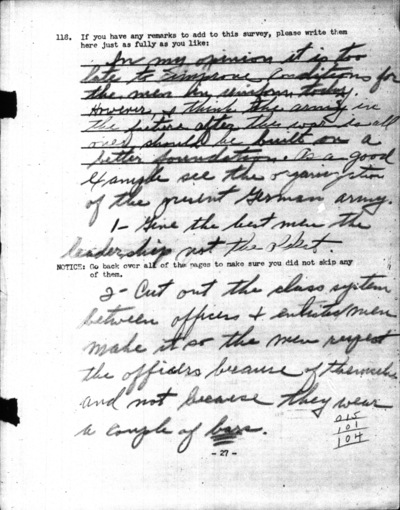
1. Give the best men the leadership not the oldest.
2. Cut out the class system between officers and enlisted men. Make it so the men respect the officers because of themselves and not because they wear a couple of
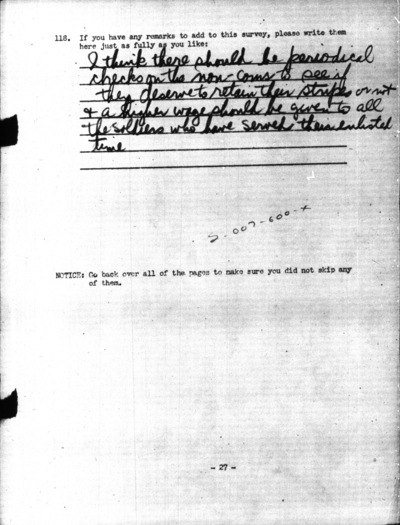

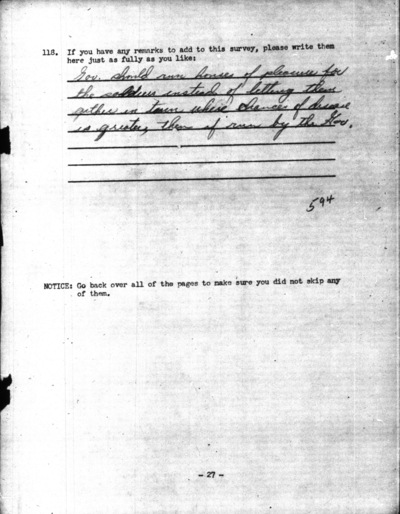
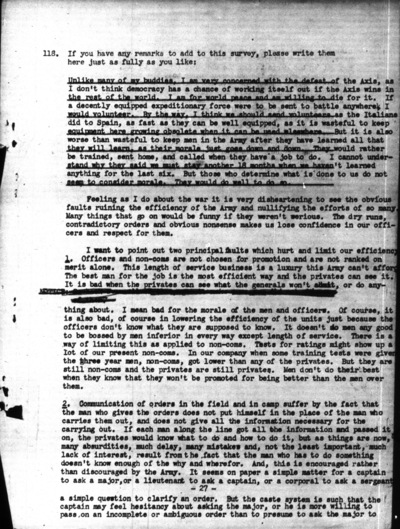
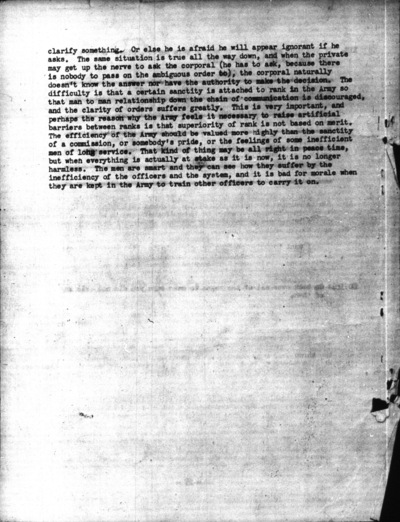
Feeling as I do about the war it is very disheartening to see the obvious faults ruining the efficiency of the Army and nullifying the efforts of so many. Many things that go on would be funny if they weren't serious. The dry runs, contradictory orders and obvious nonsense makes us lose confidence in our officers and respect for them.
I want to point out two principal faults which hurt and limit our efficiency
1. Officers and non-coms are not chosen for promotion and are not ranked on merit alone. This length of service business is a luxury this Army can't afford. The best man for the job is the most efficient way and the privates can see it. It is bad when the privates can see what the generals won't admit, or do any-
2. Communication of orders in the field and in camp suffer by the fact that the man who gives the orders does not put himself in the place of the man who carries them out, and does not give all the information necessary for the carrying out. If each man along the line got all the information and passed it on, the privates would know what to do and how to do it, but as things are now, many absurdities, much delay, many mistakes and, not the least important, much lack of interest, result from the fact that the man who has to do something doesn't know enough of the why and wherefor. And, this is encouraged rather than discouraged by the Army. It seems on paper a simple matter for a captain to ask a major, or a lieutenant to ask a captain, or a corporal to ask a sergeant a simple question to clarify an order. But the caste system is such that the captain may feel hesitancy about asking the major, or he is more willing to pass on an incomplete or ambiguous order than to presume to ask the major to


Also I don't think it necessary to send soldiers to camps so far away from home. There are better ways of helping the railroads than letting the soldiers subsidize them. When a soldier goes home on furlough, he has to spend all his earnings for railroad fare and has nothing left with which to enjoy his vacation.
I think it is high time we get our war & munitions industries working at 100% capacity. Too much time is wasted bickering over prices & wages. I am in favor of the gov't exercising full
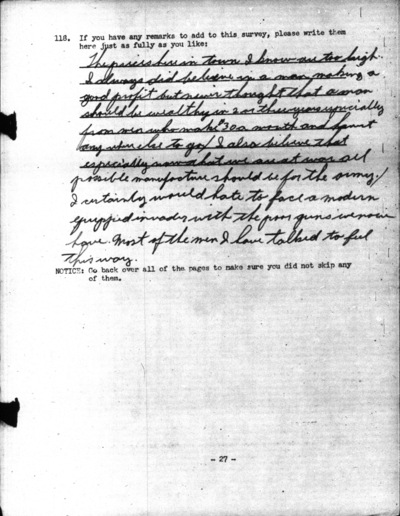
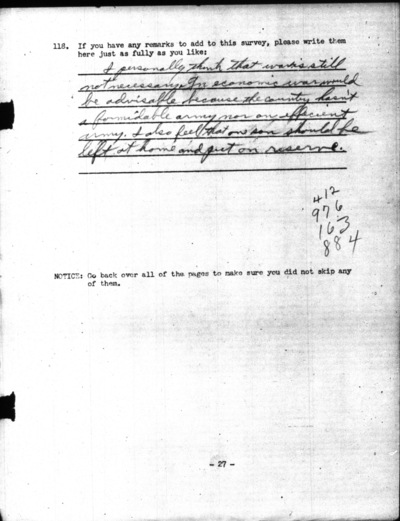

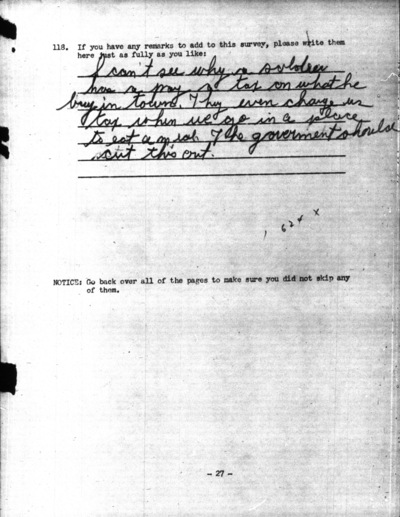
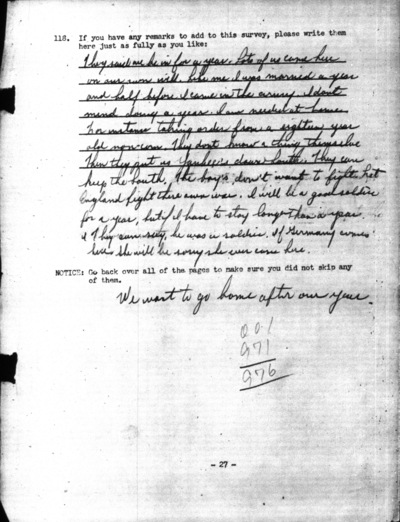
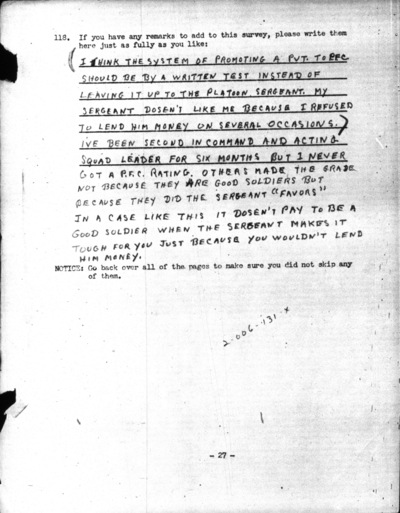
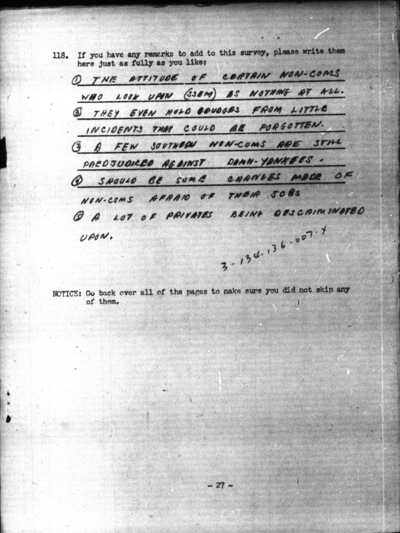
2 They even hold grudges from little incidents that could be forgotten.
3 A few southern non-coms are still predjudiced against damn-yankees.
4 Should be some changes made of non-coms afraid of their jobs.
5 A log of privates being descriminated upon.
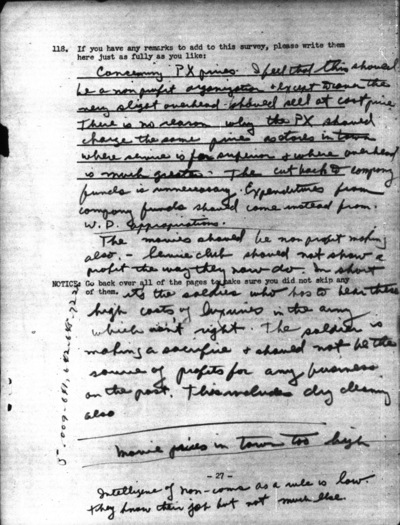
The movies should be non-profit making also. Service club should not show a profit the way they now do. In short it's the soldiers who has to bear these high costs of luxuries in the army which isn't right. The soldier is making a sacrifice + should not be the source of profits for any business on the post. This includes dry cleaning also.
Movie prices in town too high.
Intelligence of non-coms as a rule is low. They know their job but not much else.
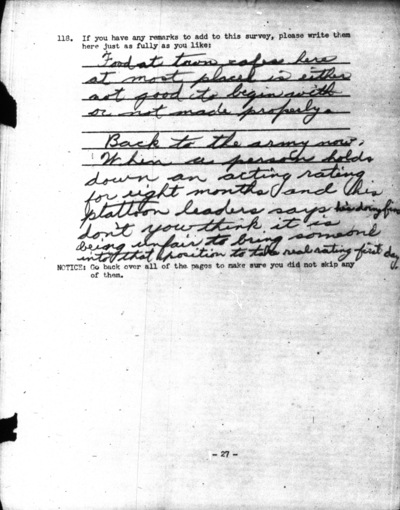
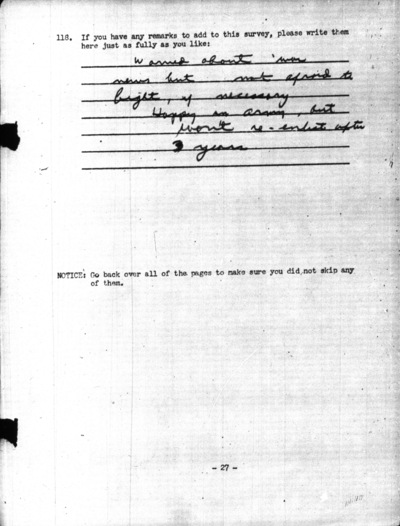
Happy in army, but won't re-enlist after 3 years

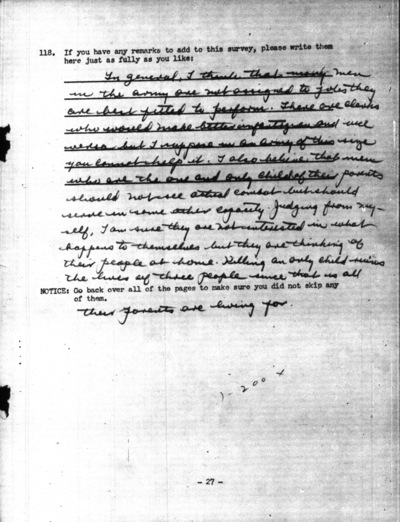
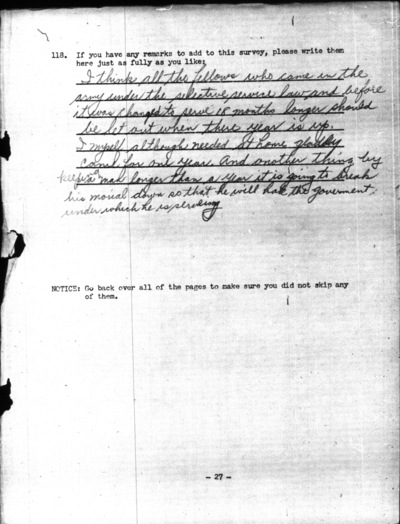

1. Give the best men the leadership not the oldest.
2. Cut out the class system between officers and enlisted men. Make it so the men respect the officers because of themselves and not because they wear a couple of





Feeling as I do about the war it is very disheartening to see the obvious faults ruining the efficiency of the Army and nullifying the efforts of so many. Many things that go on would be funny if they weren't serious. The dry runs, contradictory orders and obvious nonsense makes us lose confidence in our officers and respect for them.
I want to point out two principal faults which hurt and limit our efficiency
1. Officers and non-coms are not chosen for promotion and are not ranked on merit alone. This length of service business is a luxury this Army can't afford. The best man for the job is the most efficient way and the privates can see it. It is bad when the privates can see what the generals won't admit, or do any-
2. Communication of orders in the field and in camp suffer by the fact that the man who gives the orders does not put himself in the place of the man who carries them out, and does not give all the information necessary for the carrying out. If each man along the line got all the information and passed it on, the privates would know what to do and how to do it, but as things are now, many absurdities, much delay, many mistakes and, not the least important, much lack of interest, result from the fact that the man who has to do something doesn't know enough of the why and wherefor. And, this is encouraged rather than discouraged by the Army. It seems on paper a simple matter for a captain to ask a major, or a lieutenant to ask a captain, or a corporal to ask a sergeant a simple question to clarify an order. But the caste system is such that the captain may feel hesitancy about asking the major, or he is more willing to pass on an incomplete or ambiguous order than to presume to ask the major to


Also I don't think it necessary to send soldiers to camps so far away from home. There are better ways of helping the railroads than letting the soldiers subsidize them. When a soldier goes home on furlough, he has to spend all his earnings for railroad fare and has nothing left with which to enjoy his vacation.
I think it is high time we get our war & munitions industries working at 100% capacity. Too much time is wasted bickering over prices & wages. I am in favor of the gov't exercising full







2 They even hold grudges from little incidents that could be forgotten.
3 A few southern non-coms are still predjudiced against damn-yankees.
4 Should be some changes made of non-coms afraid of their jobs.
5 A log of privates being descriminated upon.

The movies should be non-profit making also. Service club should not show a profit the way they now do. In short it's the soldiers who has to bear these high costs of luxuries in the army which isn't right. The soldier is making a sacrifice + should not be the source of profits for any business on the post. This includes dry cleaning also.
Movie prices in town too high.
Intelligence of non-coms as a rule is low. They know their job but not much else.


Happy in army, but won't re-enlist after 3 years




1. Give the best men the leadership not the oldest.
2. Cut out the class system between officers and enlisted men. Make it so the men respect the officers because of themselves and not because they wear a couple of





Feeling as I do about the war it is very disheartening to see the obvious faults ruining the efficiency of the Army and nullifying the efforts of so many. Many things that go on would be funny if they weren't serious. The dry runs, contradictory orders and obvious nonsense makes us lose confidence in our officers and respect for them.
I want to point out two principal faults which hurt and limit our efficiency
1. Officers and non-coms are not chosen for promotion and are not ranked on merit alone. This length of service business is a luxury this Army can't afford. The best man for the job is the most efficient way and the privates can see it. It is bad when the privates can see what the generals won't admit, or do any-
2. Communication of orders in the field and in camp suffer by the fact that the man who gives the orders does not put himself in the place of the man who carries them out, and does not give all the information necessary for the carrying out. If each man along the line got all the information and passed it on, the privates would know what to do and how to do it, but as things are now, many absurdities, much delay, many mistakes and, not the least important, much lack of interest, result from the fact that the man who has to do something doesn't know enough of the why and wherefor. And, this is encouraged rather than discouraged by the Army. It seems on paper a simple matter for a captain to ask a major, or a lieutenant to ask a captain, or a corporal to ask a sergeant a simple question to clarify an order. But the caste system is such that the captain may feel hesitancy about asking the major, or he is more willing to pass on an incomplete or ambiguous order than to presume to ask the major to


Also I don't think it necessary to send soldiers to camps so far away from home. There are better ways of helping the railroads than letting the soldiers subsidize them. When a soldier goes home on furlough, he has to spend all his earnings for railroad fare and has nothing left with which to enjoy his vacation.
I think it is high time we get our war & munitions industries working at 100% capacity. Too much time is wasted bickering over prices & wages. I am in favor of the gov't exercising full







2 They even hold grudges from little incidents that could be forgotten.
3 A few southern non-coms are still predjudiced against damn-yankees.
4 Should be some changes made of non-coms afraid of their jobs.
5 A log of privates being descriminated upon.

The movies should be non-profit making also. Service club should not show a profit the way they now do. In short it's the soldiers who has to bear these high costs of luxuries in the army which isn't right. The soldier is making a sacrifice + should not be the source of profits for any business on the post. This includes dry cleaning also.
Movie prices in town too high.
Intelligence of non-coms as a rule is low. They know their job but not much else.


Happy in army, but won't re-enlist after 3 years


